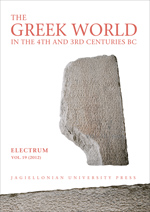The Importance of the Hoplite Army in Aeneas Tacticus’ Polis
The Importance of the Hoplite Army in Aeneas Tacticus’ Polis
Author(s): Bogdan BurligaSubject(s): History
Published by: Wydawnictwo Uniwersytetu Jagiellońskiego
Keywords: Aeneas Tacticus; the hoplites; the Greek warfare.
Summary/Abstract: The identification of Aeneas Tacticus has always been a matter of dispute. Most often he is supposed to have been a mercenary officer, probably from Stymphalus, to whom Xenophon makes reference in Hellenica, 7.3.1. Accordingly, one may find the views that in Aeneas’ treatise a mercenary perspective is adopted, a claim also supported by the observation that the author records the phenomenon of the ubiquitous popularity of paid soldiers in the Greek warfare system of the fourth century BC. In this paper it is argued that Aeneas’ outlook in fact had little in common with mercenary ethics; instead, it is the writer’s deep commitment to civic values (explicitly stated in the Preface) that is stressed. Especially worth pointing out remains Aeneas’ belief that during siege civic patriotism still matters. It is a value on which success in overwhelming the invaders depends: all the steps and preventive actions of the city’s dwellers leading to a successful defense of a native polis must be rooted – according to him – in the conviction that polis in its material (territory, estates, shrines, temples, walls) and spiritual dimension (religion, gods, respect for the parents) constitutes the best framework for life. By the same token, a relatively high importance is given by Aeneas to hoplite troops, usually consisting of yeomen and farmers who were the owners of land. In the author’s conviction they could provide the best possible protection to a polis. Looking from a purely military point of view, hoplite forces – together with auxiliary troops (the light-armed and cavalry, if possible) – were also useful at the time when the enemy entered the city’s territory and ravaged it before attempting a direct assault on the walls.
Journal: Electrum. Studia z historii starożytnej
- Issue Year: 2012
- Issue No: 19
- Page Range: 61-81
- Page Count: 21
- Language: Polish

